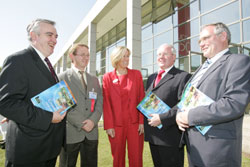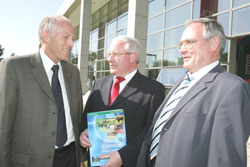|

Pictured at the opening of the International Grassland Congress hosted by UCD are Prof Pat Gibbons, Vice-president UCD, Dr Frank O�Mara Congress Secretary, Ms Nicola McGraine, Conference Partners Ltd, Mr Brendan Smith T.D., Minister of State for Food and Horticulture and Mr Jim Flanagan, Director Teagasc.
The International Grassland Congress, which is the premier event in the world for the latest information on grass-based food production, is being hosted by UCD and has attracted 1,500 of the world�s leading scientists, economists and policy makers. This is the first time for Ireland to host the event since its inauguration in Leipzig, Germany in 1927.
Congress secretary, Dr Frank O�Mara, Faculty of Agri-Food and the Environment, said the event gives Ireland a unique opportunity to showcase its competitive advantage as a producer of milk, beef and lamb from nutritious grass. While also giving UCD staff the opportunity to demonstrate their collaborative research projects in this broad area.
�Irish agriculture is overwhelmingly grass-based. The proportion of land devoted to grass in Ireland is almost twice the average of the original 15 EU member states. The proportion of land devoted to cereal growing is just 7% in Ireland compared to 18% in the UK and 26% across the rest of the original 15 member states,� said Frank O�Mara.

Professor Maurice Boland, Mr Brendan Smith T.D.,
Mr Jim Flanagan, Director Teagasc.
The congress, which runs until Friday, will hear about the expected huge growth in consumption of meat and dairy products in Asia over the next two decades and the implications of this for Ireland�s and Europe�s producers. It will also discuss how the irrigation of over 250 million hectares worldwide, more than 60 times Ireland�s agricultural area, is affecting water quality, water tables and the economics of food production.
The congress is being jointly hosted by the Irish Grassland Association and the British Grassland Society. The organising committee is comprised of senior executives from the Department of Agriculture and Food, Teagasc, UCD and the Northern Ireland Department of Agriculture and Rural Development.
Speaking at the opening, Dr Myles Rath of the Faculty of Agri-Food and the Environment said that continuing changes in climate are likely to significantly alter the systems of farming practiced in Ireland. He told delegates that summer droughts leading to severe reductions in grass growth are likely to be more common over the coming decades.
In a paper prepared jointly with Mr Steve Peel of the UK Department for Environment, Food and Rural Affairs on farming trends in Ireland and the UK, Dr Rath said that evidence of climate change is becoming stronger.
�Four of the five warmest years recorded in central England since records began in 1772 have occurred since 1990. Also, an analysis of weather data for the UK for the past 150 years shows higher levels of rainfall in winter and lower levels in summer since the mid 1970s,� said Dr Rath.
�In Ireland and the UK, we can expect more variable weather with more extremes occurring. In addition to drier summers, we can expect temperature and rainfall to increase in winter. While winter grass growth will increase, wetter soils will make livestock grazing difficult.�
�The trend will be for grass to be devoted almost entirely to grazing with significant reductions in the amount of grass conserved as silage. The amount of maize grown by farmers as a winter feed for livestock will increase and there is also likely to be more interest by farmers in lucerne and other drought-resistant crops,� he said.
Dealing with the impact of the latest reform of the Common Agricultural Policy, Dr Rath said that, if the expected drop in milk price materialises, milk production in the less-favoured areas can only be viewed as a transition phase to non-intensive part-time farming. Also, the introduction of the Water Framework and Nitrate Directives will force intensive grassland farmers, who are mainly in dairying, to reduce stock numbers or export animal manures to neighbouring farms.
The Congress concludes on Friday 1st July.
|


